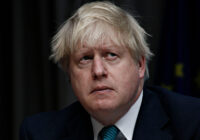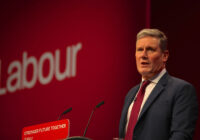How might a new way forward on Brexit be uncovered if the existing deal is not accepted? Former Irish Prime Minister John Bruton explains.
Avoiding a no-deal Brexit will require radical change in the way Parliament makes decisions. Now that the withdrawal agreement negotiated with the European Union has been rejected twice by the House of Commons, MPs must now turn to discovering what alternative approach might find actual support. Only then can the UK engage meaningfully with the EU.
This process must be completed by April 10, the date of a possible special meeting of the European Council on Brexit. Otherwise, the UK will simply crash out of the EU with no deal on April 12, with dire consequences for all.
So, how might the House of Commons organize itself to make the key decisions, and will the British government facilitate — or deliberately hinder — the process? There have been suggestions that Prime Minister Theresa May might call a general election if support is gathering for a solution she does not like or which might split the Conservative Party irrevocably.
What Can Be Done?
The options for decision-making in the House of Commons have been analyzed in an excellent paper published last week by The Constitution Unit of University College London. One proposed way — for example, by Kenneth Clarke and others — of organizing the question is to offer preferential voting, which is a proportional representation system of choosing between options. This method is already used for choosing the chairs of committees in the House. It would avoid the problems of the yes/no voting system and encourage more sincere voting.
But the choices to be made are complex and contingent on other choices by other people. MPs may find themselves needing to know how their colleagues will vote on other questions before they can decide how to vote on the question that is actually in front of them. To address this problem, The Constitution Unit suggests that two separate ballots might be held. The first ballot would ask MPs to rank preferences (1, 2, 3) between:
i) Moving straight to Brexit on the existing deal without a referendum
ii) Accepting a Brexit deal, but on condition that it is put to the people for approval in a referendum
iii) Ending the Brexit process by revoking Article 50 and staying in the EU on existing terms as a full-voting member (an option that still exists up to April 12)
These options are incompatible with one another, so the result of the ballot would clarify matters. The option that receives the most support would then be the basis for a second ballot. If MPs do not vote in the first ballot to revoke Article 50 and stay in the EU, a second ballot might then ask them to rank different options for a Brexit deal on a preference basis. They would have to mention their order of preference between four options:
a) The prime minister’s current deal, including the Irish backstop and proposed customs arrangements
b) The current withdrawal agreement, including the backstop, with significantly looser customs arrangements (the Canada-style model), which in practice would make the backstop more likely to be brought into effect
c) The current withdrawal agreement alongside significantly closer arrangements (the Norway model or Common Market 2.0), which would in practice make use of the backstop unnecessary
d) A no-deal Brexit
The result of this ballot would establish the wishes of the House of Commons. Obviously, the process would have to be public, so each MP’s ballot paper would need to be published. However, the whole initiative could be completed in a day.
Would May Accept Such a Process?
It would be necessary to have a government in place that would intend to fulfill the preferences of the House in a sincere and constructive way. Only a government can negotiate with the EU’s chief negotiator, Michel Barnier, not 650 MPs.
Paving the way for a PR-type ballot will be very difficult. The Conservative Party has a deep dislike of the whole idea of PR. Yet PR may be the only way out of its present dilemma.
 It is also important that the issue be decided on the basis of free votes, although it has to be recognized that an MP, who is threatened with possible deselection by his/her constituency association, is not entirely free. If Prime Minister May refuses to allow some such system of discerning the will of Parliament, or if she declines to accept the result in a sincere spirit, the question would arise as to whether she should continue in office.
It is also important that the issue be decided on the basis of free votes, although it has to be recognized that an MP, who is threatened with possible deselection by his/her constituency association, is not entirely free. If Prime Minister May refuses to allow some such system of discerning the will of Parliament, or if she declines to accept the result in a sincere spirit, the question would arise as to whether she should continue in office.
Ultimately, the House of Commons holds the power — and hence the threat — of removing the government from office. Under the Fixed-Term Parliaments Act, a vote of no-confidence does not immediately result in a general election, but triggers a 14-day period during which a new government can be formed.
There is no necessity that a new prime minister be one of the party leaders; any MP could become prime minister. Instead, it would be crucial for any new prime minister to command the confidence of the House of Commons — beyond the confines of the Conservative Party — to deliver the next stage of the Brexit process.
The views expressed in this article are the author’s own and do not necessarily reflect Fair Observer’s editorial policy.
Support Fair Observer
We rely on your support for our independence, diversity and quality.
For more than 10 years, Fair Observer has been free, fair and independent. No billionaire owns us, no advertisers control us. We are a reader-supported nonprofit. Unlike many other publications, we keep our content free for readers regardless of where they live or whether they can afford to pay. We have no paywalls and no ads.
In the post-truth era of fake news, echo chambers and filter bubbles, we publish a plurality of perspectives from around the world. Anyone can publish with us, but everyone goes through a rigorous editorial process. So, you get fact-checked, well-reasoned content instead of noise.
We publish 2,500+ voices from 90+ countries. We also conduct education and training programs
on subjects ranging from digital media and journalism to writing and critical thinking. This
doesn’t come cheap. Servers, editors, trainers and web developers cost
money.
Please consider supporting us on a regular basis as a recurring donor or a
sustaining member.
Will you support FO’s journalism?
We rely on your support for our independence, diversity and quality.






